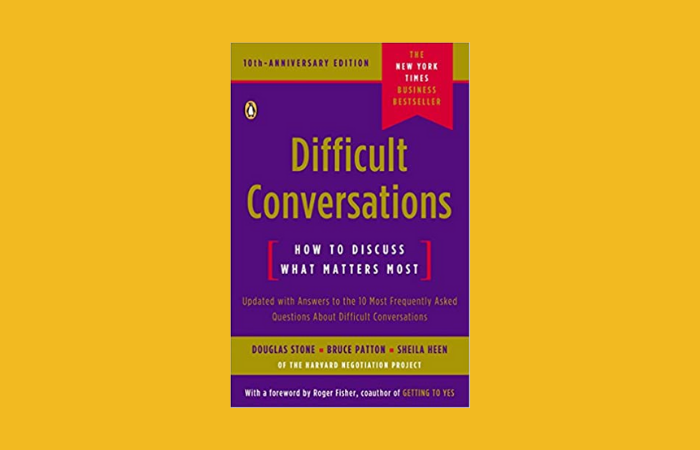Difficult Conversations: How to Discuss What Matters Most, Douglas Stone, Bruce Patton, and Sheila Heen, (New York: Viking Penguin, 1999).
Buy it here on Amazon.
Difficult Conversations Synopsis
In the book, Difficult Conversations: How to Discuss What Matters Most, readers learn how to tackle conversations they often avoid. The authors provide a framework and tools for both initiating and managing through difficult conversations. They also outline the three types of difficult conversations, the common pitfalls, and most importantly, how to turn a difficult conversation into a learning conversation.
People avoid difficult conversations because of the possible consequences. As humans, we are generally loss averse. Thus, if the potential consequence comes with a risk of loss, even a small one, we will tend to avoid the situation. However, leaving the situation the same is rarely an optimal solution. And in some cases, it can lead to exacerbated problems.
Key topic #1: The 3 types of difficult conversations

There are three types of difficult conversations. They are the “What Happened?”, feelings, and identity conversations.
“What Happened?” conversation – In this conversation, individuals are concerned about who is right and who is to blame. In almost all cases, each person assumes themselves as being right and blames the other person is to blame. This type of approach leads to reasoning that misconstrues the other individual’s original intent.
Feelings conversation – The feelings conversation is about how an individual feels after another person performs (or withholds) an action. Expressing how one feels is already risky as it requires the person to be open and vulnerable. For example, confronting a close colleague who made a joke about you that was a putdown can be difficult. While your close colleague may have no intention of hurting you, admitting that it was hurtful requires vulnerability.
Identity conversation – This conversation occurs when an individual is being branded as something that challenges their sense of who they are. For example, you may consider yourself a loyal person. You’ve worked at the same company for over 10 years and you receive another offer to join another and even better company. You question whether this would mean you are disloyal to the company.
Key topic #2 – Learning Conversations
Learning conversations are difficult conversations turned into productive, solution-driven discussions. Individuals can turn difficult conversations into learning conversations by applying a few tools.
With “What Happened?” conversations, individuals can make them more productive by being curious, assessing impact, and acknowledging contribution. This diffuses the blame game that typically arises with such conversations. By asking questions such as “What is this person seeing that maybe I don’t?” or “Does this person have more information than me?” you can gain another perspective and understanding of the situation.
With impact, try to avoid believing that the person’s intentions were malicious. Rather focus on their actions and what they did. This will also help you reframe perspective and will also help with the third component, which is acknowledging contribution. Take the discussion to what both parties’ contribution is. Applying these tools will take a difficult conversation into a learning conversation.
Key topic #3 – Feelings Conversations and your emotional footprint
Applying a similar approach, feelings conversations can turn into learning conversations. One of the first steps is to explore why your feelings are what they are. This entails understanding your emotional footprint, which is how you react emotionally, what you feel is OK to share and what is not. Ways to explore this include being curious about how you reacted emotionally as a child.
Next, negotiate your feelings by applying the “What Happened?” conversation method of curiosity, impact, and contribution. When you become defensive, what is causing those feelings? It is rarely another person’s intention to make someone defensive, so what contributed to those feelings and how can you change your view of it? By doing this you can
The last step is to share your feelings both good and bad. This ensures that the other person can have a chance to understand how you feel.
Key topic #4 – Take a third-person view
One way to approach a difficult conversation is to take on the view of a third person. This means refraining from starting within your own story. Starting at your own story can threaten the self-image of the other individual. As a result, they may become defensive. Instead, start from a third person and point out the differences between the two stories.
Key takeaways of Difficult Conversations
- People avoid difficult conversations out of fear of its consequences; however, status quo is usually no better.
- The three types of difficult conversations are the “what happened?” the feelings, and the identity conversations.
- When dealing with difficult conversations, take the time to turn them into learning conversations.
Difficult Conversations – Author bios
Douglas Stone is the cofounder of Triad Consulting and a lecturer at Harvard Law School. His work in mediations has taken him all across the globe to countries like South Africa and Greek to work with journalists, diplomats, and even the World Health Organization.
Bruce Patton co-founded the Harvard Negotiation Project with Roger Fisher. He is also the co-author of Getting to Yes: Negotiating Agreement without Giving In. Patton currently teaches negotiation workshops and advanced negotiation both at Harvard and for various clients.
Sheila Heen is the other half of Triad Consulting. She touts an impressive corporate client list which includes BAE, HSBC, and Standard Bank of South Africa. Heen is also part of the Harvard Negotiation Project.
